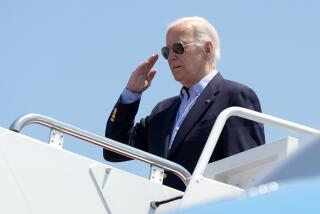U.S., Moscow Agree on Russian Role in Bosnia : Diplomacy: Under preliminary pact, Kremlin would be consultant on peacekeeping. It would also join NATO in overseeing its troops.
With the deployment of the first American troops to Bosnia now said to be only days away, U.S. Defense Secretary William J. Perry on Tuesday announced an agreement in principle with Moscow that gives Russia a consultative role in the NATO-led peace implementation force in the Balkans.
Speaking at the North Atlantic Treaty Organization headquarters here after meeting with his Russian counterpart, Pavel S. Grachev, Perry said that Moscow’s concerns about a lack of control at the operation’s political level were resolved by an agreement to establish a NATO-Russia commission based in Brussels. That body would deal with issues related to the estimated 1,500 Russian soldiers expected to be among the 60,000 peace enforcement troops.
Perry stressed that all decision-making for the operation will remain within NATO.
Tuesday’s agreement followed four meetings between the two defense ministers conducted over several weeks.
While the formula must still be formally approved by NATO ambassadors and the Russian leadership, it appears to clear the way for what most defense experts not long ago would have considered impossible: Russian soldiers serving in a NATO operation.
The agreement adds important political clout to the operation that far exceeds the relatively small number of troops Moscow has decided to dispatch. And in the longer term, Russia’s involvement is considered an extremely encouraging sign for future European stability.
“It’s important to get this right, because this will affect the security relations in Europe between NATO and Russia, between the U.S. and Russia, for years to come,” Perry said. “As important as it is to get this right for Bosnia, it also casts a larger shadow.”
Many political analysts believe that the future of NATO and of European stability into the next century depends heavily on the ability of Western allies to build a constructive, cooperative military relationship with Moscow.
Perry said the military code name given to the Bosnia operation, Joint Endeavor, reflects this spirit of cooperation.
The alliance also appears to have given up very little to get Russian involvement. While Moscow initially insisted on a share of political control over the Bosnia operation, it eventually settled for the right to be consulted and offer advice.
Russia had also rejected the idea of placing its troops under NATO command, but it effectively gave way on that point earlier this month by agreeing to a formula that places a Russian officer, Col. Gen. Leonty Shevtsov, as a deputy to NATO’s supreme commander, U.S. Army Gen. George A. Joulwan.
Despite the concessions, Grachev seemed pleased after his meetings, first with Perry and then with all 16 Atlantic Alliance defense ministers.
“I felt a desire on the part of all ministers to cooperate with Russia,” he told reporters after the meetings. “Any question can be resolved if there is the strong will to do so that I saw among ministers here today.”
Senior NATO military officers said the Russian forces will probably consist of one infantry and one airborne battalion. They are expected to be attached to the U.S. Army’s 1st Armored Division and to be deployed in the strategic Posavina corridor, a narrow strip of land in northern Bosnia-Herzegovina that links two Serb-controlled areas.
The 1st Armored Division, which will provide the bulk of the 20,000 American troops, will be based near the northern town of Tuzla. Senior officers here indicated that in addition to the Russians, a reinforced battalion of 1,200 Turkish troops, a Polish unit and a 4,000-strong Nordic brigade composed of forces from Scandinavian and Baltic countries could also be placed under U.S. command.
Units from other smaller countries will come under the command of French forces, responsible for southern Bosnia, or be attached to British units that will be stationed in western areas of the country.
Senior NATO military officials here also confirmed comments made by Perry earlier in the day that as many as 700 American troops, operating as part of a vanguard for the peace force, could deploy to Bosnia within the next several days.
Along with a similar number that would be sent to Croatia, these troops would prepare for the arrival of the first command centers and combat forces of the main implementation force.
“The key in the timing is the date of the Paris conference,” noted one officer, referring to the meeting planned for Paris in which all parties are expected to sign the peace settlement negotiated and initialed last week in Dayton, Ohio.
The first elements of the main force are scheduled to arrive within three to four days after the agreement is signed.
No date has been set for this conference, although NATO officials talk of mid-December.
“If the signing is mid-December, then the advance units will go in as early as next week,” the officer said.
More to Read
Sign up for Essential California
The most important California stories and recommendations in your inbox every morning.
You may occasionally receive promotional content from the Los Angeles Times.






